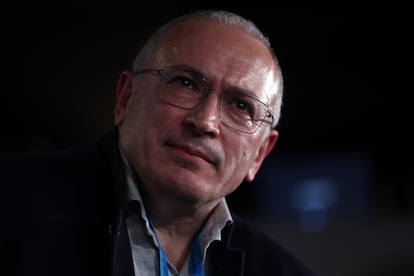Mikhail Khodorkovsky: ‘To achieve change in Russia, people have to be ready to fight’
The former oligarch and Putin’s major opponent believes that the only realistic chance is to take advantage of a rift in the regime

After the failure of the Yevgeny Prigozhin-led revolt and with the anticipated Ukrainian counteroffensive stalled and the unexpected outbreak of the conflict between Hamas and Israel distracting the West, Vladimir Putin seems to have moved past his most critical moment. Mikhail Khodorkovsky, an important opponent of the Kremlin regime, gives his views of the current situation in an interview at the headquarters of the Elcano Royal Institute in Madrid, Spain.
A former oil oligarch who was imprisoned for a decade (2003-2013) in a Russian prison, Khodorkovsky now lives outside Russia. From exile, he seeks to promote the country’s democratization. He is convinced that it is not feasible to achieve that through peaceful protests and elections, and that the only realistic opportunity is division within the regime. To take advantage of the opportunities that arise, “people have to be prepared to fight,” he says.
Question. What is your analysis of the domestic situation in Russia?
Answer. It is the typical situation of a population that is in the midst of a slow war, where there’s no end in sight. There is apathy, rather than active support or active protest. There is a high level of alarm at the possibility of defeat. The likelihood that Putin will go away on his own is nil. The likelihood that people will take to the streets and the security forces will not oppose them is very low. Therefore, the most likely option for change is conflict within the regime. That is very likely in the event of a military defeat, when they’re looking for someone to blame. In the context of such a conflict, Putin’s fall is possible.
Q. You have said that force, or the threat of force, is necessary to bring about change. How should the opposition prepare for this scenario?
A. The opposition cannot confront the army or the state security forces. The prospect of preparing people in clandestine camps to fight them is not realistic. That is why a fissure, a rift within Putin’s clique — which would take the army out of the equation — is the most viable option. The case of Belarus offers food for thought. People took to the streets, stood in front of the ministries, but with no intention of entering. In the Russian context, a situation like that would not yield any results. People have to be prepared to fight against the facility security officers, who would be few in number, or against the forces that would take power and would not be very numerous. There is no need for specific preparation for a fight like that. It is enough for the opposition leaders to convey to the people that they cannot back down. It is necessary to support those people who can do it, using civilian weapons.
Q. Should the democratic opposition have tried to intervene with weapons to support Prigozhin’s attempted revolt?
A. I think so. It was a moment of possibility. Unfortunately, Prigozhin did not last long. [The revolt] lasted 10 hours. It would take at least three days to get the people to rise up.
Q. You believe that the only realistic option for change is a rift in the Putin regime. How can the opposition ensure that this leads to democratization, that it is not just replacing one tsar with another?
A. That’s a good question. First, we have to get people to understand that politics cannot depend on the mere leadership of one person. Then, those of us in the opposition have to be much more prepared than we were during the Prigozhin revolt. To do that, we have to realize that rifts between some bad guys and other bad guys are just what we need, and we have to take advantage of it. That requires some effort and that is what we are doing. And we also have to learn to act in a coalition. That is not as important for gaining power, but if we want democracy as a result, then a coalition is practically the only way.
Q. Aren’t you concerned that resorting to arms could lead to a major civil conflict?
A. I have participated in similar situations twice. In 1991 [the attempted coup against Mikhail Gorbachev] and in 1993 [the constitutional crisis in Boris Yeltsin’s Russia]. In those cases, everything was circumscribed.
Q. What happened with the Prigozhin revolt and what is your interpretation of it?
A. I said right away that, in my opinion, [Prigozhin] was not the key figure in that revolt. I think that the important person, for whom all this was done, was [Sergey] Surovikin [the Russian military high commander with responsibilities in Ukraine who was later dismissed]. Prigozhin did not have sufficient authority within the Armed Forces; unlike Surovikin, he could not get significant support. Important figures in the army were behind Prigozhin. But, for one reason or another, they did not act to support him initially, and then it was too late.
Q. What is the current state of the Putin regime?
A. Since the revolt, Putin has been able to recoup some of his losses, but not all of them. The main problems will continue to afflict him. First, this revolt has shown that Putin has no support among the citizens of the cities. Everyone realized that the civilian population did not support him. Secondly, we’ve seen that he does not have sufficient support within the ranks of the army. We saw how the army units moved away from the road on which Prigozhin was traveling with his troops. And thirdly, the annihilation of Prigozhin has shown the entire elite that making agreements with Putin is useless.
Q. How much support does Putin receive from the Chinese regime?
A. China’s support for Putin is significant. China’s position is extremely important for circumventing the oil blockade and for the supply of banned products. It is also on a secondary level. [We] understand that North Korea does not supply armaments to Putin without China’s approval.
Q. How would you describe your relationship with Alexei Navalny’s faction of the opposition?
A. As of today, Navalny’s supporters are divided into two parts. Some of them are ready to communicate with us. We have good relations with them; we cooperate. Others, those from the anti-corruption foundation, do not want to cooperate. I take it easy. They certainly represent a part of the opposition, but not a significant part. I always leave the door open for them.
Q. What can the opposition do now?
A. The first objective is to do counterpropaganda. Another is self-education, learning to act in a coalition.
Q. How likely is it that a new rift will emerge in the short and medium terms?
A. To a great extent, that depends on the war situation. When you see an obvious failure by the Kremlin, the likelihood of a revolt radically increases.
Sign up for our weekly newsletter to get more English-language news coverage from EL PAÍS USA Edition
Tu suscripción se está usando en otro dispositivo
¿Quieres añadir otro usuario a tu suscripción?
Si continúas leyendo en este dispositivo, no se podrá leer en el otro.
FlechaTu suscripción se está usando en otro dispositivo y solo puedes acceder a EL PAÍS desde un dispositivo a la vez.
Si quieres compartir tu cuenta, cambia tu suscripción a la modalidad Premium, así podrás añadir otro usuario. Cada uno accederá con su propia cuenta de email, lo que os permitirá personalizar vuestra experiencia en EL PAÍS.
¿Tienes una suscripción de empresa? Accede aquí para contratar más cuentas.
En el caso de no saber quién está usando tu cuenta, te recomendamos cambiar tu contraseña aquí.
Si decides continuar compartiendo tu cuenta, este mensaje se mostrará en tu dispositivo y en el de la otra persona que está usando tu cuenta de forma indefinida, afectando a tu experiencia de lectura. Puedes consultar aquí los términos y condiciones de la suscripción digital.









































